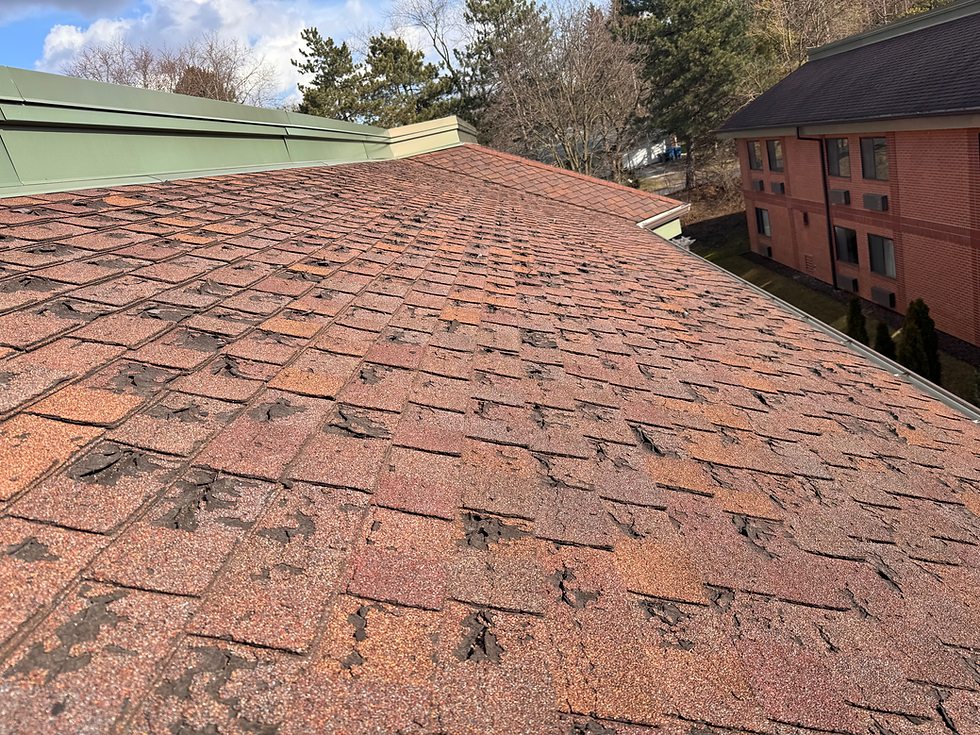What Does an Asphalt Shingle Manufacturer Warranty Actually Cover? Understanding Labor Coverage and Warranty Duration
- rbeisel005
- Feb 14, 2025
- 4 min read
Replacing your asphalt shingle roof is not just about enhancing your home's curb appeal; it’s also about protecting your investment. Homeowners typically spend between $10,000 and $25,000 for a new roof, depending on size, materials, and location. Yet, many don't fully grasp the details of their asphalt shingle manufacturer warranty. Understanding these warranties can help ensure long-lasting performance and minimize unexpected costs.
In this post, we will simplify the different aspects of asphalt shingle manufacturer warranties, focusing on what they cover, warranty duration, the proration structure, and the inclusion of labor costs.
What Is an Asphalt Shingle Manufacturer Warranty?

An asphalt shingle manufacturer warranty is a commitment from the manufacturer ensuring that their roofing products are free from defects, but only under specific conditions. Homeowners typically encounter two main warranty types: material warranties and labor warranties.
Material warranties cover manufacturing defects in the shingles themselves, while labor warranties address the costs related to installation or repair. An understanding of these warranties is essential, as it helps homeowners engage effectively with contractors and safeguard their investment in a new roof.
Types of Warranties
1. Material Warranty

Material warranties protect against defects in the actual shingles, such as cracking, curling, blistering, or significant granule loss. Most manufacturers offer limited warranties lasting between 20 and 50 years, but specific coverage varies widely. For instance, a prominent brand like CertainTeed might provide a 50-year warranty on their top-tier products, so digging into the warranty details is crucial to know what must be fulfilled to keep the warranty valid.
2. Labor Warranty
Labor warranties can vary significantly and often depend on the contractor’s qualifications. If a certified contractor installs shingles and subsequent issues arise, the warranty may extend to cover labor costs for replacing faulty sections. In a recent survey, about 40% of homeowners found themselves with unexpected installation charges due to non-compliance with manufacturer guidelines, highlighting the importance of hiring certified professionals.
What Does the Manufacturer Warranty Cover?
Familiarizing yourself with the warranty's coverage can prevent frustration later on. Here are common elements typically covered by asphalt shingle warranties:
1. Defects in Material
Warranties generally address significant defects in the shingles. For example, if a homeowner discovers that the shingles are experiencing rapid granule loss, they could file a claim to replace them without footing the bill for new materials.
2. Retrofitting Costs
Some warranties cover retrofitting costs associated with replacing defective shingles. For instance, homeowners may find themselves financially supported if they need to replace a faulty section identified by the manufacturer within the warranty period.
3. Coverage Transfer
A beneficial feature of many warranties is the option to transfer them to new homeowners when selling the property. This can significantly enhance resale value, making the house more attractive to potential buyers who will also gain roofing coverage.
4. Exclusions
It's equally important to note what is not covered. Most manufacturers exclude damage due to improper installation, extreme weather events, or lack of maintenance. For a warranty to be valid, it must meet specific installation guidelines.
Does It Cover Labor for Homeowners?
Many homeowners ask whether labor costs are covered. While some warranties may include this aspect, it generally depends on installation specifics and warranty terms.
Coverage Scenarios
Certified Installation: If a certified installer handles the roofing job and defects arise, labor costs are usually covered to fix the issues, providing peace of mind to the homeowner.
Non-Certified Labor: If the shingles are installed by a non-certified contractor or if the installation fails to meet the manufacturer’s requirements, labor costs could be lost, leaving the homeowner responsible for any repairs.
How Long Does the Manufacturer's Warranty Last?
The duration of an asphalt shingle manufacturer warranty can differ by brand and product line. Generally, warranties last between 20 and 50 years. Here are some key considerations:
1. Transfer Options:
For warranties transferable to new homeowners, coverage duration is typically shorter, often reflecting the remainder period of the original warranty.
2. Lifetime Warranties:
While some offer "lifetime" warranties, these usually apply exclusively to the original homeowner and come with stringent conditions.
How Does Warranty Proration Work?
Proration affects how warranty coverage decreases over time, particularly with extended warranties. Here's a straightforward look at how it works:
1. Initial Years
In the initial years, warranties typically provide full coverage. For instance, if a defect surfaces within the first five years, the manufacturer may cover the full replacement cost.
2. Decreasing Coverage
As years progress, the coverage often becomes prorated. After ten years, a manufacturer might cover only 70% of the replacement costs, reflecting the roof's age.
3. Understanding Specifics
It's crucial to review specific warranty documents to grasp proration schedules, as some manufacturers offer more favorable terms than others.
Claims Process for Warranty Coverage
If a homeowner needs to file a claim, knowing the claims process can make a significant difference. Here’s a breakdown of steps to follow:
1. Documentation
Homeowners should keep thorough documentation, including purchase receipts, installation records, and maintenance logs. These can greatly expedite the claims process.
2. Contacting the Manufacturer
Once a defect appears, homeowners should reach out to the manufacturer. Having documentation at hand simplifies communication and helps clarify the case.
3. Follow-up Procedures
Some manufacturers may send representatives to evaluate the issue before approving the claim. Staying patient and diligent is key to successfully resolving warranty matters.
Key Takeaways for Homeowners
Replacing your asphalt shingle roof is an important decision, and the manufacturer's warranty plays a vital role in protecting that investment. While these warranties offer coverage for material defects, labor costs often hinge on the installation process and adherence to guidelines.
Review the fine print, maintain detailed records, and ensure proper installation. By understanding what your warranty does and does not cover, you can navigate your roofing choices with confidence.


